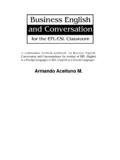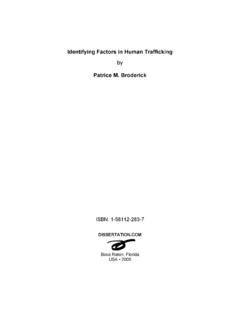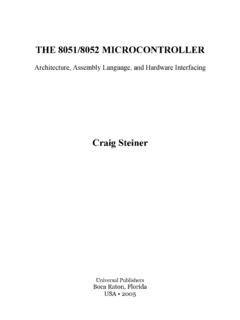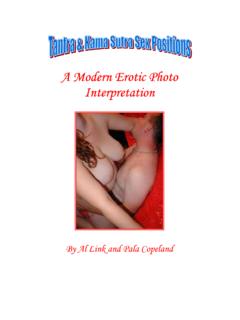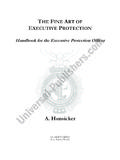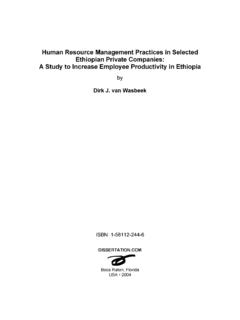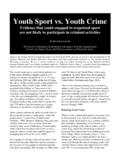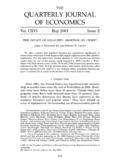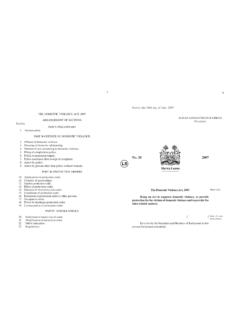Transcription of Emile Durkheim On Crime And Punishment (An …
1 Emile Durkheim On Crime And Punishment (An Exegesis). by Seamus Breathnach ISBN: 1-58112-154-7. USA 2002. Emile Durkheim On Crime And Punishment (An Exegesis). Copyright 2002 Seamus Breathnach All rights reserved. USA 2002. ISBN: 1-58112-154-7. Til minde om Jette iii iv Emile Durkheim . ON Crime AND Punishment . (An Exegesis). BY. SEAMUS BREATHNACH. Table of Contents Page Introduction 1. Chapter 1: Criminology and Philosophy 3. Chapter 2: Criminal and Penal Statics A. Criminal Statics or Crime Defined 16. B. Penal Statics or Punishment Defined 26. C. Crime and Punishment 32. Chapter 3: Criminal and Penal Dynamics A. Social Dynamics 42. B. Criminal Dynamics 56. C. Penal Dynamics 67. Chapter 4: Crime and Punishment and the State A.
2 The State 76. B. Crime and the State 92. C. Punishment and the State 98. Chapter 5: The Moral, the Methodological, and the Normal A. Crime and Morality 105. B. Methodology 113. C. Normal Crime 124. Chapter 6: Notes Towards a Critical Appreciation 133. Appendix A 139. References 143. Select Bibliography (updated) 150. Introduction By their very nature theories of Crime and Punishment presuppose the more primary theoretical formulations both of evolution and society, the one answering the theoretical time requirement, the other the spatial requirement, and each symbiotically related to the other in an integral theory of social evolution. Into such an overall perspective sink Durkheim 's theories of Crime and Punishment .
3 It is the intention of this essay to explicate these theories without, it is hoped, paying too much attention to extra- criminological or penological concerns at their expense. In his theory of evolution, for example, Durkheim felt the necessity to differentiate himself, from Comte and Spencer ; in his social theory from theorists like Rousseau, J. Stuart Mill, Hobbes, and Machievelli ; in his theory of Crime from Lombroso, Tarde, Garofalo and the Italian School ; and in his theory of Punishment (as in his 'theory' of the State) from Kant and the utilitarians. In anthropology, philosophy, religion, political economy, morality and pedagogy similar differentiations are made. There is, therefore, in a work of this modest nature, an obvious need to choose not just what is pertinent to Durkheim 's theories of Crime and Punishment , but, also, what is important.
4 Since the aim of the essay is an expositional account of these theories, the more popular interest in 'anomy' and 'suicide' are not formally dealt with. Because of this overriding perspective and the lack of space available, criticism has practically been reduced to a hurried sixth chapter. This latter constraint has also prohibited recourse to original French texts. Consequently, there is a total reliance on popular translations of Durkheim 's major works - a reliance which, if we are to accept the advice of the erudite, must necessarily cast some doubt on the interpretation which these pages purport to ascribe to Durkheim 's theories of Crime and Punishment . Steven Lukes has found serious fault with these translations, particularly the two major texts upon which this essay has heavily relied, viz.
5 'The Division of Labour' and 'The Rules.' In view of such limitations it is only fair to warn the reader that Durkheim 's own words - even in translation - have been faithfully, if not always wisely, preferred. -1- The following abbreviations should be familiarised by the reader , lest their repeated appearance irritate him unduly. I am not at all convinced that the use of these abbreviations benefits either the reader or the writer one whit - but it seemed like a good idea at the time. Abbreviations Used DOL = The Division of Labour in Society, trans. by G. Simpson, 1933. ROSM = The Rules of The Sociological Method, trans. by Solovay and Mueller, 1938. S= Suicide: A Study in Sociology, trans. by Spaulding and , 1975.
6 TLOPE = Two Laws of Penal Evolution, trans. by T. Anthony Jones and Andrew T. Scull, Economy and Society, v. 2, no. 3, Aug., 1973. JS = The introduction to TLOPE by Jones and Scull EFRL = The Elementary Forms of the Religious Life, trans. by Swain, 1976. EAS = Education and Sociology, trans. by Fox, 1956. SAP = Sociology and Philosophy, trans. by D. F. Pocock, 1933. ME = Moral Education, trans. by Wilson and H. Schnurer, 1961. PECM = Professional Ethics and Civic Morals, trans. by C. Brookfield, 1957. SL= Steven Lukes: Emile Durkheim : His Life and Work, A Historical and Critical Study', 1973. -2- Chapter 1. CRIMINOLOGY AND PHILOSOPHY. It is convenient for the purposes of this part of the essay to treat Durkheim as (i) a rationalist, (ii) a conceptualist, and (iii) a realist philosopher.
7 As a rationalist we attempt to locate his status within a historical perspective; as a conceptualist we shall attempt to illustrate his approach to the theory of Crime and Punishment ; and as a realist we shall attempt to describe his contribution to the theory of universals. Durkheim as Rationalist Descartes, whom Durkheim quotes in support of his scientific sociology (though not to any great effect), is generally regarded as the father of modern rationalism. Philosophers like Malebranche, Spinoza and Leibniz can be seen to trace their views back to the famous Cartesian 'cognito' and the dualism between mind and matter which, as we shall see, Durkheim tried - methodologically - to bring together. Generally speaking, however, rationalism finds its truest expression in Kant, who completed the Cartesian revolution and upon whose thought theorists like Fichte, Schelling and Hegel have mounted their 'weltanschauungen'.
8 Even if we define 'rationalism' in its narrow sense as the use of reason to dispel irrational religious beliefs, Kant's 'Pure Theory', and Durkheim 's 'Elementary Forms', have at least the death of God in common - and, of course, the passage from a a theocentric world to an anthropocentric or philocentric one (in the case of Kant), and to a sociocentric one (in the case of Durkheim ). Having attacked the foundations upon which the existence of a Thomistic/Aristotelian God was based, Kant was forced to find a new foundation for the absoluteness of moral values. This he grounded, not in the will of the Divine, but as Masterson points out, 'in the a priori forms of man's own understanding and the autonomy of man's pure practical reason'.
9 (1) God is replaced by the transcendental dimensions of the human spirit itself, and in order to regulate the practical affairs of men the moral imperative or categorical imperative is introduced. For Durkheim 'the clan' or 'society' is God: -3- "In the world of experience 1 know of only one being that possesses a richer and more complex moral reality than our own, and that is the collective being. I am mistaken; there is another being which could play the same part, and that is the Divinity. Between God and society lies the choice .. I can only add that I myself am quite indifferent to this choice, since I see in the Divinity only society transfigured and symbolically expressed." (2). This distinction between God and society is of primary importance, not just in locating Durkheim in the history of philosophy, but in understanding his whole theoretical outline, the relationship between the individual and the group, the notion of the sacred, his interpretation of history as moving from a religious to a human type of society and the parallel movements of law and morality, his secular morality, his methodology, and his theory of Punishment and expiation.
10 For both Kant and Durkheim God is the master-concept - or in Kelsen's terms, the Grundnorm - which any epistemological thesis must embrace. Consequently, Durkheim writes: "Kant postulated God, since without this hypothesis morality is unintelligible. We postulate a society specifically distinct from individ- uals ,since otherwise morality has no object and duty no roots." (3). From our point of view it is sufficient to note how Durkheim 's sociology dealt with the cult of the individual arising out of the Cartesian revolution and, for that matter, the Christian ethic itself. This emphasis on the individual rather than the group has had important consequences for sociology and criminology. In sociology it has found echoes in Weber and defenders of western individualism like Popper (4) (against the real or imaginary totalitarianism of Plato's universals, Hegel's idealism, and Marx's communism).
